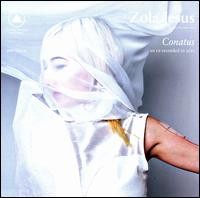ZOLA JESUS Conatus lyrics

In the vein of titles like Valusia and Stridulum, Zola Jesus' Conatus has a name that will send listeners scrambling for the dictionary. However, the term, which refers to the will to survive and evolve, couldn't be more fitting for this set of songs. Nika Roza Danilova appears swathed in white on the album's cover, the polar opposite of the blue-black murk that covered her on Stridulum. As on that album, the grime of her earlier work is gone, but where Stridulum reached out with somber reassurance, Conatus is internal, examining destruction, surrender, survival, and rebirth up close. ?Hikikomori? takes its name from the Japanese term for people who withdraw from society, and revels in solitude even though its beat could set a dancefloor in motion. ?Ixode,? meanwhile, uses a hard-bodied tick as inspiration for its subtly insistent warmth. Conatus' sound also feels like the other side of Stridulum's clarity, presenting fractured beats and electronics (it's no coincidence that Danilova made her Warp Records debut in a collaboration with Prefuse 73 earlier in 2011) alongside strings and other organic elements in a pristine studio setting: the single ?Vessel? presents a seamless mesh of tightly coiled, robotic rhythms and Danilova's ricocheting vocals.
Over the course of the album, Danilova nods to goth, synth pop, industrial, and abstract electronica without pledging allegiance to any one style; she's forging her own path, with the help of producer Brian Foote, her touring drummer Nick Johnson, and string players Sean McCann and Ryan York. Despite Conatus' experiments, the vital elements of Zola Jesus' sound -- massive drums and Danilova's throatily majestic voice -- are as unmistakable as ever. Her instrument is undeniably powerful, and more controlled here than it was before, but there's still a remarkable rawness and vulnerability on songs such as the fatalistic ?In Your Nature.? ?Skin?'s self-loathing sounds like hitting bottom (albeit beautifully), and confessions like ?it hurts to let you in? on ?Collapse? manage to be as comforting as they are blunt. This complexity extends even to Conatus' relatively accessible moments, which inch closer to pop without actually delivering it. Only Danilova could make a more or less straightforward power ballad called ?Lick the Palm of the Burning Handshake"; ?Seekir?'s rousing beat beckons, but Danilova's intensity is still formidable; and ?Avalanche? sets her pleas for love to handclaps that sound like they're straight from a Casio. While Conatus isn't as direct as Stridulum, it's still some of her most satisfying work. This is music made in and for the darkest hours, and a striking portrait of the times when crisis and opportunity meet. by Heather Phares.All Music Guide
Over the course of the album, Danilova nods to goth, synth pop, industrial, and abstract electronica without pledging allegiance to any one style; she's forging her own path, with the help of producer Brian Foote, her touring drummer Nick Johnson, and string players Sean McCann and Ryan York. Despite Conatus' experiments, the vital elements of Zola Jesus' sound -- massive drums and Danilova's throatily majestic voice -- are as unmistakable as ever. Her instrument is undeniably powerful, and more controlled here than it was before, but there's still a remarkable rawness and vulnerability on songs such as the fatalistic ?In Your Nature.? ?Skin?'s self-loathing sounds like hitting bottom (albeit beautifully), and confessions like ?it hurts to let you in? on ?Collapse? manage to be as comforting as they are blunt. This complexity extends even to Conatus' relatively accessible moments, which inch closer to pop without actually delivering it. Only Danilova could make a more or less straightforward power ballad called ?Lick the Palm of the Burning Handshake"; ?Seekir?'s rousing beat beckons, but Danilova's intensity is still formidable; and ?Avalanche? sets her pleas for love to handclaps that sound like they're straight from a Casio. While Conatus isn't as direct as Stridulum, it's still some of her most satisfying work. This is music made in and for the darkest hours, and a striking portrait of the times when crisis and opportunity meet. by Heather Phares.All Music Guide
- Vessel
- Swords
- Avalanche
- Hikikomori
- Ixode
- Seekir
- In Your Nature
- Lick the Palm of the BurningHandshake
- Shivers
- Skin
- Collapse
- Swords
- Avalanche
- Hikikomori
- Ixode
- Seekir
- In Your Nature
- Lick the Palm of the BurningHandshake
- Shivers
- Skin
- Collapse
.png)




